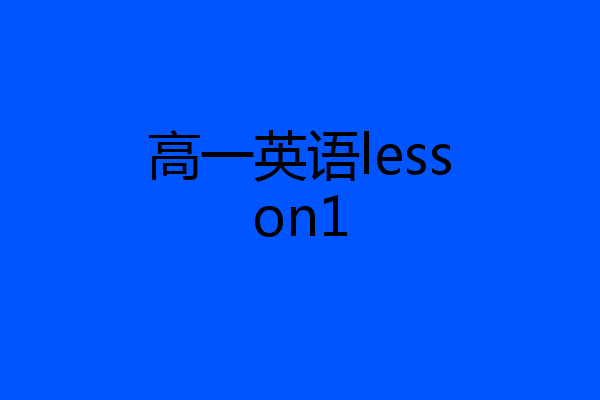
c阿c的鲁鲁
高一英语必修1单词表 Unit 1survey 调查;测验 add up 合计 upset adj. 心烦意乱的;不安的,不适的 ignore不理睬;忽视 calm vt.&vi.(使)平静;(使)镇定 adj.平静的;镇定的;沉着的 calm(...)down (使)平静下来 have got to 不得不;必须 concern(使)担心;涉及;关系到 n. 担心;关注;(利害)关系 be concerned about 关心;挂念 walk the dog 溜狗 loose adj 松的;松开的 vet 兽医 go through 经历;经受 Amsterdam 阿姆斯特丹(荷兰首都) Netherlands 荷兰(西欧国家) Jewish 犹太人的;犹太族的 German 德国的;德国人的;德语的. Nazi 纳粹党人 adj. 纳粹党的 set down 记下;放下;登记 series 连续,系列 a series of 一连串的;一系列;一套 outdoors在户外;在野外 spellbind 迷住;疑惑 on purpose 故意 in order to 为了 dusk 黄昏傍晚 at dusk 在黄昏时刻 thunder vi 打雷雷鸣 n. 雷,雷声entire adj. 整个的;完全的;全部的 entirely adv. 完全地;全然地;整个地 power能力;力量;权力。 face to face 面对面地 curtain 窗帘;门帘;幕布 dusty adj 积满灰尘的 no longer /not … any longer 不再partner 伙伴.合作者.合伙人 settle 安家;定居;停留vt 使定居;安排;解决 suffer vt &遭受;忍受经历 suffer from 遭受;患病loneliness 孤单寂寞 highway公路 recover痊愈;恢复 get/be tired of 对…厌烦 pack捆扎;包装打行李 n 小包;包裹 pack ( sth ) up 将(东西)装箱打包 suitcase手提箱;衣箱 overcoat大衣外套 teenager 十几岁的青少年 get along with 与…相处.进展 gossip 闲话;闲谈 fall in love 相爱;爱上 exactly 确实如此;正是;确切地 disagree 不同意 grateful 感激的;表示谢意的 dislike 不喜欢;厌恶 join in 参加;加入 tip 提示;技巧;尖;尖端;小费 vt.倾斜;翻倒 secondly 第二;其次 swap 交换 item 项目;条款保准正确,采纳吧(*^__^*) 嘻嘻……


猫熊奶奶
高一英语必修1单词表 Unit 1survey 调查;测验 add up 合计 upset adj. 心烦意乱的;不安的,不适的 ignore不理睬;忽视calm vt.&vi.(使)平静;(使)镇定 adj.平静的;镇定的;沉着的calm(...)down (使)平静下来have got to 不得不;必须 concern(使)担心;涉及;关系到 n. 担心;关注;(利害)关系 be concerned about 关心;挂念 walk the dog 溜狗 loose adj 松的;松开的 vet 兽医 go through 经历;经受 Amsterdam 阿姆斯特丹(荷兰首都) Netherlands 荷兰(西欧国家) Jewish 犹太人的;犹太族的 German 德国的;德国人的;德语的. Nazi 纳粹党人 adj. 纳粹党的 set down 记下;放下;登记 series 连续,系列 a series of 一连串的;一系列;一套 outdoors在户外;在野外 spellbind 迷住;疑惑 on purpose 故意 in order to 为了 dusk 黄昏傍晚 at dusk 在黄昏时刻 thunder vi 打雷雷鸣 n. 雷,雷声 entire adj. 整个的;完全的;全部的 entirely adv. 完全地;全然地;整个地 power能力;力量;权力。 face to face 面对面地 curtain 窗帘;门帘;幕布 dusty adj 积满灰尘的 no longer /not … any longer 不再 partner 伙伴.合作者.合伙人 settle 安家;定居;停留vt 使定居;安排;解决 suffer vt &遭受;忍受经历 suffer from 遭受;患病 loneliness 孤单寂寞 highway公路 recover痊愈;恢复 get/be tired of 对…厌烦 pack捆扎;包装打行李 n 小包;包裹 pack ( sth ) up 将(东西)装箱打包 suitcase手提箱;衣箱 overcoat大衣外套 teenager 十几岁的青少年 get along with 与…相处.进展 gossip 闲话;闲谈 fall in love 相爱;爱上 exactly 确实如此;正是;确切地 disagree 不同意 grateful 感激的;表示谢意的 dislike 不喜欢;厌恶 join in 参加;加入 tip 提示;技巧;尖;尖端;小费 vt.倾斜;翻倒 secondly 第二;其次 swap 交换 item 项目;条款

少女心-
一、教学内容:
Unit 1 of Module I Period One (Lesson 1 & 2)
二、教学目标与要求:
1、在第一课和第二课里,我们学习了如何谈论我们的生活方式。话题的选择贴近我们的生活,能引起同学们共鸣,激发同学们的学习动机。
2、复习一般现在时态和现在进行时态,以及它们的用法和区别。
3、进一步了解不同文化背景下,不同的个人生活方式,引导同学们树立良好的学习和生活习惯。
4、学习策略:运用听力策略对所听内容进行预测。
5、掌握重点单词、短语、句式,在练习中能灵活运用。
三、本周重难点词汇讲解:
1、peaceful adj .和平的,平静的
peace (n.和平)+-ful(形容词后缀)
The peaceful uses of atomic energy will do good to human beings .
原子能的和平利用将造福人类。
It's peaceful at home when the children are at school .
孩子们在学校上学时,家里就安静了。
派生词:peacefully adv. 和平地,平静地
这些形容词表明没有激动兴奋或未被打扰。
calm 隐含远离情感冲动之意;
peaceful 意指未被打破的镇静。
2、relaxing adj .轻松的,放松的
relax(v. 放松)+-ing(形容词后缀)
All the students going for holidays, it is really a relaxing evening for the headteacher.
所有的学生都度假去了,对于班主任来说这真是一个使人感到轻松的夜晚。
同根词:relaxed意为"感到轻松的"。
有些现在分词和过去分词可用作形容词,现在分词意为"令人……的",其逻辑主语是物;过去分词意为"感到……的",其逻辑主语是人。类似用法的词有:surprised /surprising; excited/exciting; frightened/frightening; moved/moving;
puzzled/puzzling
He got/became bored by her boring speech.
他被她那些令人厌烦的话搞烦了。
3、suppose的用法
1)suppose后接that引导的宾语从句,表示"认为/猜想……"。如:
As she's not here ,I suppose she must have gone home.
她不在这儿,我猜想她已经回家了。
Scientists supposed that large dinosaurs lived in swamps.
科学家们认为大型恐龙栖居于沼泽地中。
2)be supposed to 是个固定词组,意思是"应该,有……的义务"。如:
I thought we were supposed to be paid today.
我以为我们今天会领到薪水呢。
3)suppose/supposing可以引导条件状语从句,相当于if 的作用。如:
Supposing(that) you are wrong,what will you do then?
假设你错了,那你会怎么办?
4、prefer vt.更喜欢,宁愿
派生词:preferable adj .更可取的,更合意的;
preference n.喜爱,偏爱
-Which would you prefer,tea or coffee? 咖啡和茶你更喜欢哪个?
-I prefer tea to coffee.我更喜欢茶。
1)请注意prefer的搭配及用法:
(1)prefer(doing)sth.to (doing) sth.……相比,更喜欢……如:
I prefer coffee to milk.和牛奶相比,我更喜欢咖啡。
I prefer listening to music to watching TV.
和看电视相比,我更喜欢听音乐。
(2)prefer to do sth. rather than(to) do sth.和做……相比,更喜欢做……如:
I prefer to listen to music rather than watch TV.
和看电视相比,我更喜欢听音乐。
(3)prefer+that从句。如:
We prefer that the plan shall be fully discussed.
我们想让这份计划被充分地讨论。
2)prefer sth.to sth.中的to是介词;prefer to do sth. rather than do sth .中to 是动词不定式的符号。
3)prefer to do…rather than do…=would rather do than do…/would do…rather than do…
5、switch on=turn on把开关打开;接通
switch off=turn off关掉;关上
switch over (to)…转换频道;转变
Then I get up, go downstairs and switch on the TV in the living room.
At weekends, he often switches on the computer early in the morning and doesn't switch it off until midnight.
周末,他一早就把计算机打开,直到半夜才关。
If there is not a good play on CCTV8, I would switch over to CCTV7.
如果中央八台没有好节目,我就换到七频道。
6、do some exercise =do some sports =take some exercise 锻炼身体
(exercise作不可数名词用时,意为"锻炼运动",作可数名词用时,意为"练习、训练"。)
do morning /eye exercises做早操/做眼保健操
He is so fat that everyone advised him to take more exercise.
他太胖了,所以,大家都劝他多锻炼身体。
Students have too many exercises to do after class.
学生课后要做的练习太多。
7、go off
1)爆炸;(爆竹、铃等)响
The gun went off with a bang. 枪砰的一声响了。
2)(食物等)变坏
This steak has gone off.这牛排坏了。
3)消失
The pain went off. 疼痛消失了。
4)进行情况;发生
The interview went off very badly. 访问进行得极不顺利。
5)睡着;失去知觉
Has the baby gone off yet? 婴儿睡着了吗?
8、take up
1)to use up, consume, or occupy: 用尽,耗掉或占用(时间/空间):
The extra duties took up most of my time.
额外工作耗费了我绝大部分时间。
2)to develop an interest in or devotion to: 喜欢,钟爱,对……产生了兴趣或钟爱:
Now he takes up mountain climbing.
现在他喜欢上登山运动。
3)to enter into (a profession or business): 开始从事(一项职业或行当):
He took up art while at school.
他在学校时开始对艺术感兴趣。
4)to begin again; resume: 再次开始;重新开始:
Let's take up where we left off.
take down 拿起;拆除(构造物);记下
take off (飞机等)起飞;脱下(衣帽等);(观念,产品等)突然大受欢迎
take on 呈现(不用于被动语态)
9、be filled with… 装着……;装满…… fill… with… 把……装进……
be full of… 装满……
Every minute of the day is filled with urgent matters.
每分钟都有很多急待处理的事情要做。
The bottle is filled with oil.
那瓶子里装满了油。/那瓶子里装着油。
The bottle is full of oil. 那瓶子里装满了油。
Don't fill the bottle with oil. 别把油装进瓶子里。
10、complain (to sb.) about/of sth. 向……抱怨……
1)vi. 抱怨;埋怨;
Almost immediately she began to complain to me about his impoliteness.
她几乎马上就对我开始抱怨起他的无礼来了。
2)诉苦;叫屈;说自己有病(of)
The boy complained of a pain in his stomach.
这孩子说他肚子痛。
3)vt. 抱怨, 控诉[常与that从句连用]
They complained that the wages were too low.他们抱怨工资过低。
They complained that the price of books had increased.
他们抱怨说书的价格提高了。
4)n. 抱怨;埋怨;不满
We have a number of complains about their service.
对他们的服务我们有些怨言。

西角阿希
dusk、suffer、highway、recover、pack等。
一、dusk
英 [dʌsk] 美 [dʌsk]
n. 黄昏;薄暮;幽暗
The lights go on at dusk.
一到黄昏灯就亮了。
二、suffer
英 ['sʌfə(r)] 美 ['sʌfər]
vt. 遭受;忍受;容忍,宽恕,听任;允许,准许
vi. 受苦;患病;受损失;变差,变糟;处于不利地位
They suffered huge losses in the financial crisis.
他们在经济危机时遭受了巨大的损失。
三、highway
英 ['haɪweɪ] 美 ['haɪweɪ]
n. 公路;(水陆空)直接航线或路线
A four-lane highway connects the two cities.
一条四车道的公路连接这两个城市。
四、recover
英 [rɪ'kʌvə(r)] 美 [rɪ'kʌvər]
v. 恢复;复原;重获
He's now fully recovered from his stroke.
他现已从中风病完全康复了。
五、pack
英 [pæk] 美 [pæk]
n. 一群;一副;包裹;一包
v. 包装;解雇;塞满;收拾行李;佩戴
He rounded on journalists, calling them 'a pack of vultures'.
他突然对记者们大发雷霆,称他们是一帮贪婪的家伙。